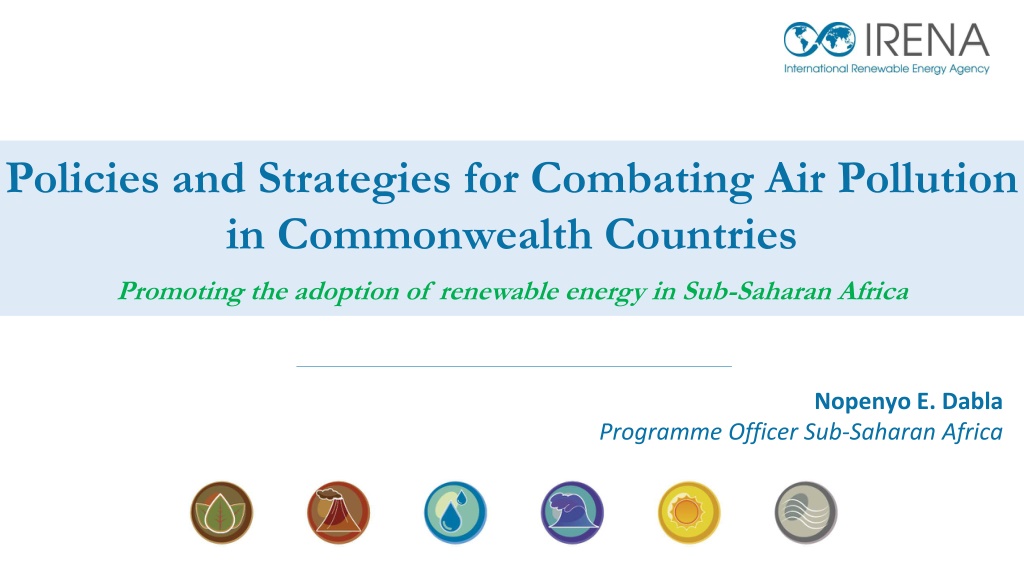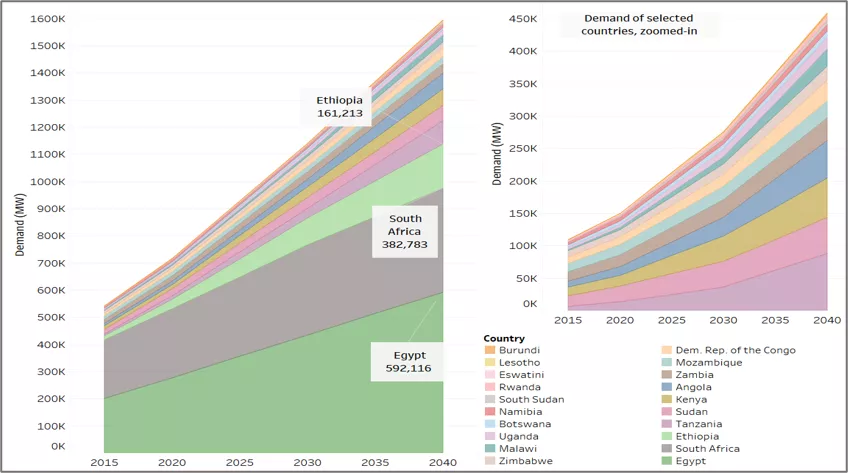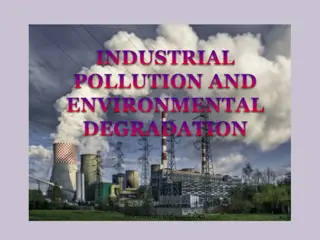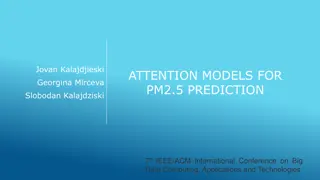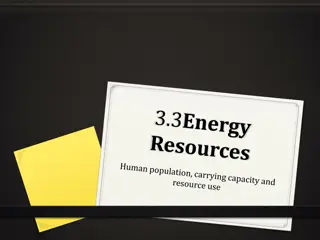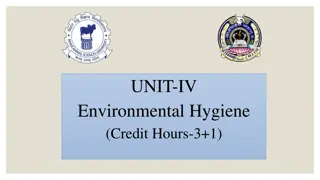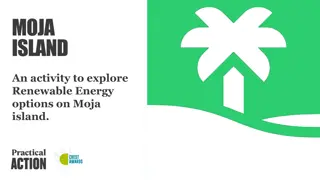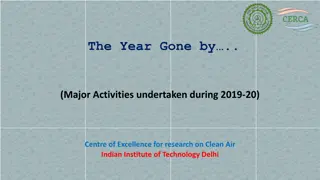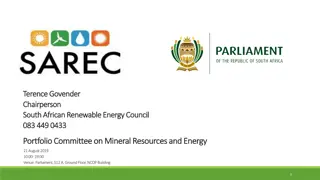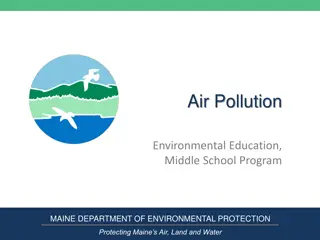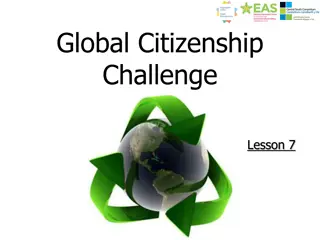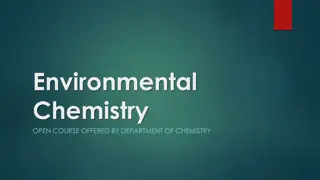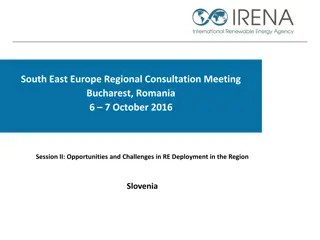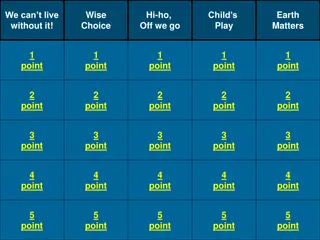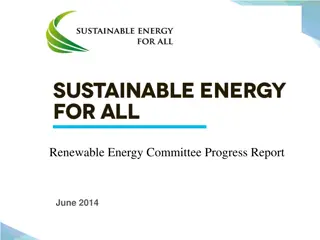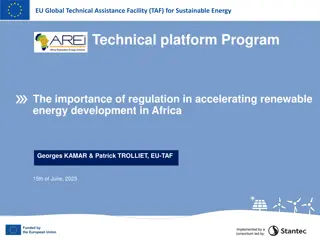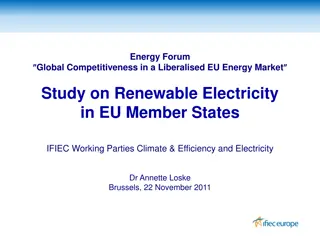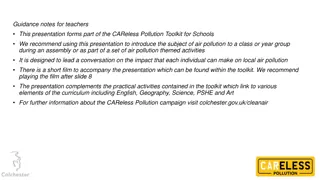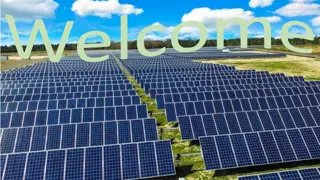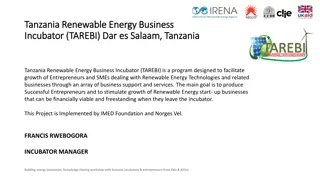Strategies for Combating Air Pollution and Promoting Renewable Energy in Africa
This content discusses policies and strategies for combatting air pollution in Commonwealth countries and promoting the adoption of renewable energy in Sub-Saharan Africa. It highlights initiatives such as clean energy corridors and electricity demand projections in different regions of Africa. The support for planning processes across countries and regions is also emphasized, showcasing efforts to promote renewable power options and strengthen cross-border trade. Political support and endorsement for clean energy corridors in Africa are outlined, reflecting a collective commitment to sustainable energy development.
Download Presentation

Please find below an Image/Link to download the presentation.
The content on the website is provided AS IS for your information and personal use only. It may not be sold, licensed, or shared on other websites without obtaining consent from the author. Download presentation by click this link. If you encounter any issues during the download, it is possible that the publisher has removed the file from their server.
E N D
Presentation Transcript
Policies and Strategies for Combating Air Pollution in Commonwealth Countries Promoting the adoption of renewable energy in Sub-Saharan Africa Nopenyo E. Dabla Programme Officer Sub-Saharan Africa
Electricity Demand Projections West Africa (2030) Eastern & Southern Africa (2040) 25.00% 20.00% 15.00% 10.00% 5.00% 0.00%
Clean Energy Corridors in Africa - Key Objectives - Promote the development of cost-effective renewable power options - Strengthen cross-border trade of renewable power - Support regional efforts for the creation of regional power markets - Implementation: - Africa Clean Energy Corridor: EAPP & SAPP countries (2014) - West Africa Clean Energy Corridor: WAPP countries (2016) - 5 Implementation Pillars: - (i) Zoning and Resource Assessment - (ii) National and Regional Planning - (iii) Enabling Frameworks for Investment - (iv) Capacity Building - (v) Awareness-raising and Political Support Eastern Africa Power Pool (EAPP) ACEC Southern Africa Power Pool (SAPP) WACEC West African Power Pool (WAPP)
Political Support Africa Clean Energy Corridor (ACEC) Approved by the Ministers of Energy for Eastern & Southern Africa in 2014 West Africa Clean Energy Corridor (WACEC) Approved by the Directors of Energy of ECOWAS in April 2016 in Dakar Adopted by the Ministers of Energy in December 2016 in Conakry Endorsed by the Heads of State and Government in June 2017 in Monrovia and was annexed to the ECOWAS Treaty Endorsed by the Specialised Technical Committee of the Africa Union through the Lom (2017) and Cairo (2019) declarations
Support Planning Processes across countries & regions Least-cost energy planning model configured and regional analyses done for all 5 sub-regions Regional trainings delivered to >200 energy planners. Inputs to regional power sector plans provided, incl. SAPP Power Plan to 2040. ECOWAS Power Generation and Transmission Masterplan to 2033. National energy planning support/inputs to national energy sector plans Eswatini (Energy Masterplan 2034) Sierra Leone (draft Energy Masterplan 2040) Cameroon Inputs to continental planning process Inputs to integration of solar PV and wind as part of process of PIDA Priority Action Plan revision.
Energy Access 530 million Africans will lack electricity in 2030 80 million households
Energy Access International Off-Grid Renewable Energy Conference and Exhibition (IOREC) Collaborative platform for sharing knowledge and best practices on approaches to scale-up off-grid renewable energy Promoting a Solar PV Market in West Africa Strengthening and developing local capacities of policymakers, regulators and utilities, financial institutions and renewable energy entrepreneurs. Renewable Energy Solutions For Healthcare Facilities ECOWAS Certification for Sustainable Energy Skills ECOWAS RE Entrepreneurship Support Facility Country-level technical support for improving electricity access of rural healthcare facilities through renewable solutions Regionally harmonised certification system recognised in all ECOWAS countries SADC RE Entrepreneurship Support Facility
Solutions for access and the deployment of renewables INTEGRATED ELECTRIFICATION STRATEGIES AND PLANNING TO DRIVE POLICY MAKING AND INVESTMENT DECISIONS POLICY FRAMEWORKS, WORKABLE REGULATIONS, AND STRONG INSTITUTIONAL ARRANGEMENTS TO CREATE ENABLING ENVIRONMENTS INNOVATIONS IN TECHNOLOGY AND BUSINESS MODELS TO REACH THE REMAINING UNSERVED POPULATION LEVERAGED PUBLIC AND PRIVATE FINANCING TO FUND ELECTRIFICATION AT SCALE LEAVING NO ONE BEHIND Tracking SDG 7: The Energy Progress Report (2020) ENERGIZING WOMEN GOING BEYOND CONNECTIONS: IMPROVING LIVELIHOODS AND HUMAN CAPITAL
IRENAs NDC Engagement EUROPE NDC Enhancement Support Albania Belarus Georgia N. Macedonia Turkey SIDS Data and Statistics LATIN AMERICA Antigua & Barbuda Bahamas Barbados Belize Dominica Dominican Republic Fiji Grenada Guyana Nauru Palau Papua New Guinea Saint Kitts & Nevis Saint Lucia Samoa Sao Tome & Principe Seychelles St Vincent & Grenadines Tonga Vanuatu Resource Assessment Long Term Energy Planning (LTEP) Cuba Ecuador El Salvador Nicaragua Panama Paraguay Uruguay Power System Flexibility (FlexTool) SSA Renewable Energy Roadmaps (REmap) Benin Botswana Eswatini Gabon Gambia Liberia Mali Mozambique Niger Nigeria Rwanda South Africa Uganda Zambia Zimbabwe Renewable Readiness Assessment (RRA) MENA RE Policy Capacity Building Egypt Jordan Lebanon Sudan Tunisia RE Technology Capacity Building ASIA NDC Implementation Support Azerbaijan Bhutan Cambodia Indonesia Kazakhstan Kyrgyzstan Mongolia Myanmar Philippines Thailand Uzbekistan Technical Assistance Project Facilitation Support Input to NDC already provided (1) Ongoing Implementation of Support (27) Scope and work plan firmed-up (5) Work plan under development (12) Scoping/Initial Discussions (20) 10
